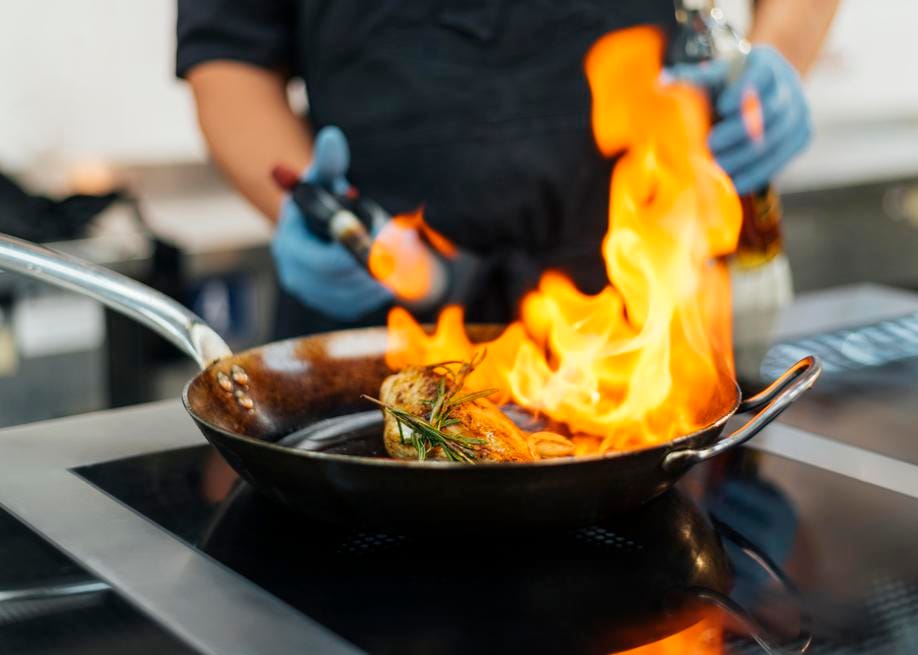Restoration 1 of West Denver is prepared to service families that experience a fire in their home – But we’d rather not! We’d rather you took the time to read this article and follow these guidelines! The kitchen is where fires usually start. But a few prevention strategies can help your family experience some heartwarming holidays – without disastrous fire. Read on.
Fires are both disastrous and costly. As autumn ramps up and friends and family gather around the table to celebrate the holidays, cooking is top priority. Cooking together can be fun, but the increased activity and potential distraction calls for vigilance in safety practices. Kitchen fires are a significant concern for homeowners and can cause extensive damage if not prevented or managed properly.
Prevention Strategies
- Attentive Cooking. The most crucial step in preventing kitchen fires is to remain vigilant while cooking. Never leave the kitchen unattended when using the stovetop or oven. If you need to step away, even for a short time, turn off the burner or use a timer to remind you to check on your food regularly.
- Maintain a Clean Cooking Area. Keep your cooking surfaces clean and free from grease buildup, food debris, and other flammable materials. Regularly clean your stovetop, oven, and other appliances to prevent the accumulation of grease and food residues that can easily catch fire.
- Safe Storage Practices. Store flammable items such as dish towels, oven mitts, wooden utensils, and food packaging away from the stovetop and other heat sources. Establish a “kid-free zone” around the stove and oven to prevent accidents involving children and pets.
- Proper Use of Appliances. Always follow the manufacturer’s instructions for your cooking appliances. Avoid overloading electrical outlets and unplug small appliances when not in use. Regularly inspect power cords for fraying or damage and replace them if necessary.
Fire Safety Equipment
- Smoke Detectors. Install smoke detectors on every level of your home, including near the kitchen (at least 10 feet away from cooking appliances). Test your alarms monthly and replace batteries at least once a year.
- Fire Extinguishers. Keep a fire extinguisher readily available in your kitchen and learn how to use it properly. Ensure that you have the correct type of extinguisher for kitchen fires (typically a Class K extinguisher for cooking oils and fats).
Handling Grease Fires. Grease fires require special attention due to their volatile nature. Never use water to extinguish a grease fire, as it will only spread the flames. Instead:
- Turn off the heat source if it’s safe to do so.
- Smother the flames by sliding a lid or baking sheet over the pan.
- Leave the cover on until the pan has completely cooled.
- Use baking soda or a chemical fire extinguisher if the fire is small and contained.
General Safety Practices
- Wear short, close-fitting, or tightly rolled sleeves while cooking to prevent clothing from catching fire.
- Use a timer when cooking to avoid forgetting about food in the oven or on the stovetop.
- Turn pot handles toward the back of the stove to prevent accidental spills or bumps.
- Avoid storing items in the oven, as they can catch fire when preheating.
- Never throw hot grease in the garbage; let it cool and dispose of it in a metal container.
Emergency Response. If a fire does occur and you cannot safely extinguish it:
- Evacuate the area immediately.
- Close doors behind you to help contain the fire.
- Call emergency services (911 in the US) from outside your home.
Specific Fire Scenarios
Oven Fires. If a fire starts in your oven:
- Keep the oven door closed.
- Turn off the heat source.
- Wait for the fire to extinguish itself before opening the door.
Microwave Fires. For fires in a microwave:
- Turn off the microwave and unplug it if safe to do so.
- Keep the door closed until the fire is completely out.
Importance of Education and Preparedness
Educate all household members about kitchen fire safety and develop an emergency evacuation plan. Conduct regular fire drills to ensure everyone knows what to do in case of a fire. By implementing these preventive measures and safety practices, you can significantly reduce the risk of kitchen fires and minimize potential damage to your home. Remember that your safety is paramount; if you have any doubt about your ability to control a fire, evacuate immediately and call for professional help. Staying vigilant, maintaining a clean cooking environment, and being prepared for emergencies are key to ensuring a safe kitchen and protecting your home from fire damage.

